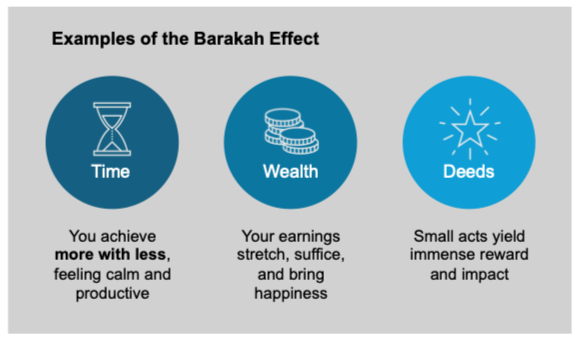The Barakah Effect
We’ve heard of the word ‘Barakah’, and while we might have heard different ways that it’s pronounced – ‘berkat’, ‘baa-ruh-kaa’, ‘bar-uh-kaa’, we’re essentially referring to the same thing. ‘Barakah’ refers to a divine blessing, and when it is bestowed upon something, it brings about abundance, growth, ease, happiness and success.
The Barakah effect: Have you experienced it?
There are different ways in which Barakah can manifest itself, through physical or unseen means. The most apparent way, however, is through ‘physical’ or ‘tangible’ means. For instance, when you arrive home right before getting caught in a sudden thunderstorm. Or you received a new job opportunity soon after starting your job search.
The Barakah Multiplier Effect
One key thing to note is that Barakah is not about having more, it’s about having enough with Allah’s blessing. What does this mean, or how does this happen? Put simply, it means that with Allah’s blessings, you could potentially experience ‘more’ with ‘less’, or -
Gratitude: A means to recognizing the Barakah Effect
To appreciate and recognize when you’ve experienced barakah, and one of the key attributes to embracing barakah culture is gratitude or shukr. But what does gratitude really mean?
The Oxford dictionary defines gratitude as ‘the quality of being thankful; readiness to show appreciation for and to return kindness.’ In Islam however, we take it a little further. Shukr involves recognizing the goodness one receives, and this can come in the form of a feeling, behaviour or social exchange.
Gratitude is an important element in Islam as it is considered a form of worship.1 It also brings spiritual and psychological benefits as it leads to greater contentment and helps to foster appreciation and counter negative feelings such as dissatisfaction or anxiety.
2 tips to embracing barakah culture
Reflections: Spend some time at the end of each day to reflect on how your day has progressed, how you can do things or approach situations differently. Journaling is one of the recommended ways to practice
Practice gratitude: Recognize and value the people Allah has placed in your life, showing appreciation for their kindness. Also make a conscious effort to value the good and not so good experiences you might have, acknowledging that everything that has happened is part of Allah’s plans for you.
